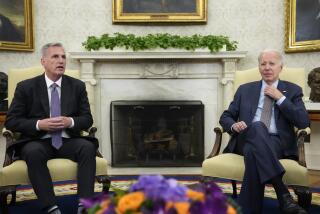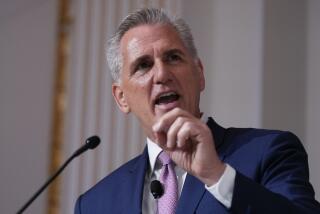Budget Sparring Begins but Key Figure Expects Main Fight Next Year
- Share via
WASHINGTON — Don’t expect too much from budget negotiations this year. The big fight--and possibly a tax increase--won’t come until next year.
That’s the assessment of Senate Budget Committee Chairman Jim Sasser (D-Tenn.), who on Thursday predicted “a minimalist approach to deficit reduction” designed to give at least the appearance of squeezing in under the $110-billion ceiling imposed by the Gramm-Rudman budget law for fiscal 1990.
Sasser spoke as top budget officials from Capitol Hill and the Administration sat down to begin two weeks of bargaining aimed at producing a broad spending blueprint for the 1990 fiscal year, which begins Oct. 1.
That blueprint ultimately will result in a deficit roughly $30 billion smaller than the $170 billion in red ink expected this year, he said.
Counts on Tax Increase
But Sasser told reporters that he is counting on the White House to accept some kind of tax increase next year as part of a larger, more significant deficit reduction package.
“(Budget Director Richard G.) Darman said privately that at some point he might take revenues to the President, but he couldn’t do it this year,” Sasser said at a breakfast session.
Darman, however, immediately denied that he had ever told Sasser a tax increase would be acceptable next year. “If he’s trying to construe that, he’s going way beyond what I’ve said,” Darman told reporters during an afternoon briefing. He contended that Sasser “may be reading into it his preferred interpretation.”
The sparring between Sasser and Darman suggests that Democrats in Congress intend to ignore the White House plea for a two-year budget agreement. That’s because they believe that Bush will have no choice but to accept a tax increase next year to meet the much tougher $64-billion deficit target specified by Gramm-Rudman for fiscal year 1991.
Optimistic Assumptions
In the meantime, the Democrats appear to be moving toward a 1990 budget plan relying on relatively modest spending cuts and optimistic economic assumptions that would at least permit them to dodge Gramm-Rudman’s automatic, indiscriminate spending cuts this fall.
Indeed, Sasser said that he expects lawmakers to claim they are meeting the Gramm-Rudman targets by adopting the Administration’s economic assumptions “and pray that the markets will swallow it for one more year.”
Under Gramm-Rudman’s convoluted rules, Congress is only required to produce a budget plan before the fiscal year begins that appears to meet the target. If lawmakers fail to accomplish that goal, the White House is supposed to impose automatic cuts that would hit defense and domestic spending equally hard.
But once the Oct. 1 deadline has passed, the law imposes no sanctions if the deficit misses the target during the year. For instance, the Office of Management and Budget officially estimated last summer that Congress’ spending plan would hold this year’s deficit under the official $146-billion ceiling, but it now is expected to reach as high as $170 billion.
Meanwhile, the Congressional Budget Office projected that Bush’s budget proposal, rather than producing the $91-billion deficit he forecast, would result in a $106-billion deficit instead. The different CBO forecast is mostly the result of its expectations for slower growth and higher interest rates than predicted by the Administration.
More significantly, the CBO projection shows the deficit staying at roughly $100 billion for the next three years rather than moving steadily toward the balanced budget forecast by the Administration in fiscal year 1993.
Nonetheless, the Bush spending plan, despite an additional $3 billion in asset sales that do not count toward the Gramm-Rudman goal, would slide in just under next year’s $110-billion deficit ceiling, CBO director Robert D. Reishchauer told a Senate committee.
Darman welcomed the opening of more formal talks with budget lawmakers. “We’ve been saying all along (that) we shouldn’t do business as usual,” he said.
Downplays Expectations
But House Speaker Jim Wright (D-Tex.), who has been cool to the idea of early budget negotiations with the White House, downplayed expectations for the new round of discussions. Rather than calling it a “summit,” he told reporters that it was “a budget plateau.”
Democrats wanted to “start with a level playing field” that would allow them to propose military spending cuts to go along with the domestic program cutbacks included in Bush’s $1.16-trillion spending plan, he said.
Sasser, meanwhile, urged reporters to wait until next year.
Democrats may be willing to go along this year with the White House’s insistence that taxes not be raised, he said, “but next year we’re going to demand that we belly up to this problem” and reach the Gramm-Rudman target without chopping programs “dear to the heart of Democrats.”
More to Read
Get the L.A. Times Politics newsletter
Deeply reported insights into legislation, politics and policy from Sacramento, Washington and beyond. In your inbox twice per week.
You may occasionally receive promotional content from the Los Angeles Times.










